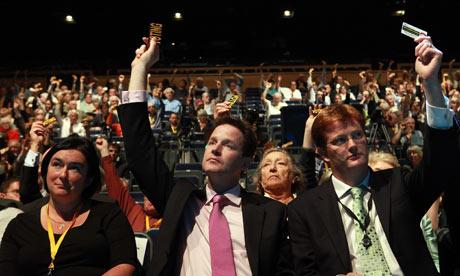
How soon will the public forgive the Liberal Democrats? And for what, if anything, should the party be seeking forgiveness for? As the Coalition Government’s Mid-Term Review approaches, these are the fundamental questions the junior party is seeking the answers to.
We all remember how different the political scene was in spring 2010. After exceptionally strong performances by Nick Clegg in the nation’s first TV debates, the election was turned on its head as support shifted from the Conservatives to the exceedingly popular “fresh choice” in UK politics. As polls showed 32% for the Lib Dems, and headlines in the left-wing press became ever wilder (one Guardian front page claimed that Nick Clegg was the most popular politician “since Churchill”), it appeared that the nation would elect a band of sincere politicians who would abandon the old era of broken political promises; create a fairer tax system and lead us to a greener future.
“The Lib Dems mean business”, many of us thought. All of their MPs signed a pledge, in front of television cameras, pledging to reject any rise in university fees. No other party had made such a serious and strong commitment to any policy.
In 2013, their poll ratings are the lowest in the party’s history. The Left are furious with the party for voting through the most regressive package tax cuts for the rich and draconian spending cuts seen since Thatcher’s government. The Right resent the “wet” approach that they supposedly take on matters such as aid and welfare reform. Members are leaving in droves. It looks as if the future of the Lib Dems as a major political force is in doubt.
Labour and the Conservatives have both always had clear purposes- they might wonder “off message” from time to time, but have always had a clear, defining set of values. One favours social justice, eliminating poverty and securing rising living standards for the masses, whilst the other advocates a society in which people stand on their own two feet, and a spirit of enterprise prevails. The Lib Dems have always suffered from a lack of purpose. For about 30 years, they have been defined, willingly or otherwise, as the protest vote party. They have sacrificed that role, and secured few of their broad aims in government. Electoral reform, a green agenda, civil libertarianism, a fairer tax system and higher education system are all defining ideas which they have abandoned.
Therefore the party will inevitably suffer heavy losses in the 2015 general election, for the suggested tactic of distancing themselves from the Conservatives will fail for the simple reason that actions speak louder than words. If Lib Dem MPs are propping up a Tory government, then they evidently don’t oppose the Tories to a significant extent.
What matters is how they rebuild themselves post-election. There is no future for the party anymore as a centre-left movement; instead they should opt to remain as an economically conservative yet socially liberal party. In such a role, there may be potential to make a partial electoral recovery- possibly in an electoral alliance with the Conservatives.
The Liberal Party left the Winston Churchill’s Wartime Coalition in 1945, rejecting offers of a further alliance with the Conservatives in 1951. Four years later, the once mighty party won just 2.7% of the national vote and 6 seats. Is there a future in history?

